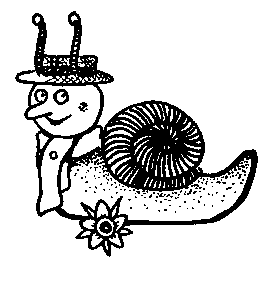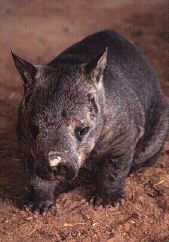Parents do awful things to children [see page 3 -- Ed]. Supposedly reasonable people use their adult perspective and privileged position to warp the mental landscape of their prey progeny. They use all the tricks -- sarcasm, litotes and often merely simple deception of the poor wee mites.
Perhaps the most commonplace and systematic deception is Father Christmas. Fuelled by marketing and institutional sentimentality, parents strictly follow the rituals. 'What do you want from Father Christmas?' 'You'd better be good.' 'Yes, he visits every house in the world in one night.' 'No it doesn't matter that we don't have a chimney'. Layer upon layer of implausible assertions teach any moderately with-it child a valuable lesson: you can't believe what adults tell you. Then again, particularly gullible children get to believe in the Easter Bunny and more -- one Plokta reader's daughter tearfully complained that the Tooth Fairy hadn't called, to be fobbed off with instructions to 'Go clean your teeth and I'll fax her a reminder.'
At least my parents had the good grace not to pretend very hard that they believed in Father Christmas and the rest. But then again, they had their own private mythology. Their distinctive reshaping of our worldview was a variation upon older tales of unguarded infants replaced by changelings. They told us we were really animals.
One day during a long car journey, soon after I learned to talk, my father was rendered witless by a stream of infantile drivel. As a tactic to halt the endless flow, he remarked in surprised tones 'Oh no! There's a bullfrog in the back seat. How did that get there?'
The infant me searched warily for this intruder. 'I can't see a bullfwog, Daddy.'
'What was that croaking, Mummy?' continued Dad.
'Sounded like a bullfrog to me' says Mum.
'Where's the fwog?' I asked, still missing the point.
By now we had stopped for some reason, and my father turned round and observed 'Oh dear. Steven has disappeared, and there's a bullfrog in his place'
'What bullfwog?'
'Croak, croak, croak.'
Slowly it dawned on me that my father thought that I had been replaced by a frog. In disturbed tones I repeatedly explained that I was 'not a fwog', becoming increasingly desperate as my pleas were repeatedly interpreted as croaks.
My parents never again tried to convince me that I was a frog, but recounted this anecdote many times. As with so many childhood memories, I find it more and more difficult to distinguish real memories from accum-ulated retellings. Except that I have a sure recall of parents transformed into sinister strangers. Couldn't they see I wasn't a bullfrog? Couldn't they hear me speaking, not croaking? Perhaps they were the changelings.
Then again, I had it easy. I was never in doubt as to my humanity, seeking only to convince my parents that they were wrong. My sister Janet was born in Australia, and discovered her place in the family bestiary when my father explained that he and my mother had found a baby kangaroo by the roadside and had taken her in. Janet treated this tale awfully seriously. She probed the details of her adoption extensively, and my father provided a detailed mythology. A sad tale of how mother kangaroo came to die was followed quickly by an explanation of how Janet the joey had her fur shaved off to fit in with human society. (Shaved at night, in the dark, so as not to wake her).
 The power of mythology is such that it continues to have meaning long after you have ceased to believe. I had a further token animal assigned to me at thirteen , but this was clearly a joke. At the onset of adolescence I was rather distracted and slow, and was dubbed Brian after the snail in The Magic Roundabout. Rather than be beaten down by this cruel mockery I decided to weather the storm, revelling in the Brian persona, and celebrating the dry wit of the television character.
The power of mythology is such that it continues to have meaning long after you have ceased to believe. I had a further token animal assigned to me at thirteen , but this was clearly a joke. At the onset of adolescence I was rather distracted and slow, and was dubbed Brian after the snail in The Magic Roundabout. Rather than be beaten down by this cruel mockery I decided to weather the storm, revelling in the Brian persona, and celebrating the dry wit of the television character.
I began to collect snails, and now possess multitudes of carved wooden snails, snails cut in crystal, snail patterned silk ties and a host of other knick-knacks and gewgaws. I even began to celebrate some of the characteristics of snailhood. If I am slow, then I am slow to anger, slow to make mistakes. I may not carry my house on my back, but I am self-sufficient. Mind you, I wouldn't want to carry this too far -- I have never been tempted to fully explore the hermaphrodite characteristics of snails, the single foot or the toothed tongue.
This whole mythology thing doesn't seem to have happened in Alison's family. With their scientific backgrounds her parents seem to have been much more concerned to warp her whole conceptual framework for cause and effect. Most notably, her father somehow managed to insinuate the notion that, because policemen are only seen directing traffic when the traffic is very congested, it follows that the police are the cause of the congestion. Fortunately Alison eventually worked this one through for herself. Before she left university in fact.
Mind you, Alison's father never managed to convince her that the earth was flat, although it took some time for her to realise that he didn't believe it himself. And she never fell for anything as rich as another Janet, who at age four was very keen to have curly hair like her sister. 'Her hair only curled because she broke her nose' explained her parents unreasonably. Janet spent six years hoping that by some happenstance she would break her nose and get curly hair. Nor was Alison cursed with a dodgy name. Plokta reader Gail Courtney was gleefully told that she earned her first name by being 'such a wet and windy baby'.
Attentive Plokta readers might wonder where all this might be leading. Perhaps you are concerned that Alison and I might be hoping to perpetrate some awful deception on our newly arrived child. Perhaps, as detailed in Plokta 3, the baby formerly preincarnated as Pod might cruelly be characterised as a man-eating upright lizard. Nothing could be further from the truth.
Regular readers know that the veracity of any article in Plokta is never in doubt, so we are sure that you will take us seriously when we announce that Marianne is in fact a wombat. A Northern Hairy-Nosed Wombat to be precise.
With impeccable timing, Croydon fandom have already explained all you need to know about wombats. While best known for their association with goats, in May this year they are running Year of the Wombat, a convention in Nottingham. The con charity is the Northern Hairy-Nosed Wombat, the rarest species of wombat. The con progress reports explain that the original 'Year of the Wombat' was in 1857, and revolved around the pre-Raphaelites, particularly Rossetti and his pet wombat. Rossetti spent considerable time at the house of his friend William Morris, in Waltham-stow, close to the borders of Epping Forest. And Epping Forest is now home to all 60 Northern Hairy-Nosed Wombats remaining in the wild.
Our local maternity hospital is at Whipps Cross, separated from Epping Forest by the busy A114. In the early hours of the morning, however, there is little traffic, and it was then that the switch took place.
How could we resist the entreaties of the wombats, when they asked that their endangered race be revitalised with new blood? We filled in the requisite forms, and signed our names in Corflu.
We are delighted with Marianne, charming little wombat that she is, but we expect that the hairy-nosed inhabitants of Epping Forest are rather puzzled by Pod, who is already introducing them to the wonders of the internet, laser printers and superfluous technology.
 The power of mythology is such that it continues to have meaning long after you have ceased to believe. I had a further token animal assigned to me at thirteen , but this was clearly a joke. At the onset of adolescence I was rather distracted and slow, and was dubbed Brian after the snail in The Magic Roundabout. Rather than be beaten down by this cruel mockery I decided to weather the storm, revelling in the Brian persona, and celebrating the dry wit of the television character.
The power of mythology is such that it continues to have meaning long after you have ceased to believe. I had a further token animal assigned to me at thirteen , but this was clearly a joke. At the onset of adolescence I was rather distracted and slow, and was dubbed Brian after the snail in The Magic Roundabout. Rather than be beaten down by this cruel mockery I decided to weather the storm, revelling in the Brian persona, and celebrating the dry wit of the television character.





